Seattle SuperSonics
Seattle SuperSonics (or simplified Sonics) were an American professional basketball team from Seattle, Washington. They were part of the Pacific and Northwest Divisions of the National Basketball Association (NBA) from 1967 to 2008. After the 2007-08 season, the franchise moved to Oklahoma City and now plays under the name Oklahoma City Thunder.
Sam Schulman owned the team from its inception in 1967 until 1983. He was followed by Barry Ackerley (1983-2001) and Basketball Club of Seattle LLP, led by Starbucks board chairman, president and CEO Howard Schultz (2001-2006). On July 18, 2006, Basketball Club of Seattle LLP sold the SuperSonics and WNBA franchise affiliate Seattle Storm to Professional Basketball Club LLC, owned by Oklahoma City entrepreneur Clay Bennett. The sale was approved by the NBA Board of Governors on October 24, 2006, and closed on October 31. Due to unapproved public funds for the construction of a new sports arena in Seattle, the SuperSonics moved to Oklahoma City prior to the 2008-09 NBA season. The new owners previously agreed with the City of Seattle to pay $45 million to cover the cost of the KeyArena lease, which remained in place until 2010.
Until the move, home games were held at KeyArena, originally called Seattle Center Coliseum. In 1978, the team moved to the Kingdome, which they shared with MLB team Seattle Mariners and NFL team Seattle Seahawks. In 1985, they moved back to the Coliseum. In the meantime, they also played in the Tacoma Dome in Tacoma (Washington) (NBA season 1994/95) while the Coliseum was rebuilt and renamed KeyArena.
The SuperSonics were able to reach the NBA title for the first and only time in 1979. In all, the franchise won three Western Conference titles: in 1978, 1979, and 1996. The team also won a division title six times, the most recent in 2005, including five in the Pacific Division and one in the Northwest Division. After a lawsuit between the City of Seattle and Clay Bennett's company, banners, trophies, and former jerseys remained in Seattle; the nickname, logo, and color scheme are available to all subsequent NBA teams. However, the Sonics' franchise history was shared with the Oklahoma City Thunder.
History of the franchise
Foundation
On December 20, 1966, Los Angeles businessmen Sam Schulman and Eugene V. Klein and a group of partners obtained the rights to an NBA franchise in Seattle. Schulman acted as chairman and head of the team. The name "SuperSonics" referred to Boeing's recent contract for the SST (Supersonic Transport) project, which was later discontinued. The SuperSonics were Seattle's first major league franchise.
The team began play in October 1967, coached by Al Bianchi. The team included All-Star guard Walt Hazzard and NBA All-Rookie Team members Bob Rule and Al Tucker. The expansion team lost its first game 144-116 and finished the season with a negative win-loss ratio of 23-59.
1968-1975: The Wilkens Era
Before the start of the new season, Hazzard was traded to the Atlanta Hawks for Lenny Wilkens. Wilkens brought a versatile game to the SuperSonics, averaging 22.4 points per game, 8.2 assists and 6.2 rebounds in the 1968/69 season, while Rule improved his rookie stats to average 24 points per game and 11.5 rebounds. However, the SuperSonics won only 30 games and Bianchi was replaced by Wilkens as player-coach in the off-season.
Wilkens and Rule represented Seattle in the 1970 NBA All-Star Game, and Wilkens scored the most assists during the 1969-70 season. In June 1970, NBA owners voted 13-4 to merge with the American Basketball Association (ABA); SuperSonics owner Sam Schulman, himself a member of the 1970 merger committee, was so eager for the leagues to merge that he publicly announced that if the NBA did not approve the merger, he would move the SuperSonics to the ABA. Further, Schulman threatened to move the franchise to Los Angeles to compete directly with the Lakers. Oscar Robertson's anti-trust lawsuit against the NBA delayed the decision and the SuperSonics stayed in Seattle. Early in the 1970-71 season, Rule tore his Achilles tendon and was unable to play for the rest of the year.
Arrival of Spencer Haywood
Wilkens was voted the best player of the 1971 All-Star Game. More importantly for the team, however, was Sam Schulman's announcement that he had managed to sign ABA Rookie of the Year and Most Valuable Player, Spencer Haywood. The following season, the SuperSonics managed to end the season with a positive record for the first time (47-35). The team, led by player-coach Wilkens and All-NBA First Team member Haywood (power forward), maintained a 46-27 record through March 3, but season-ending injuries to Haywood, Dick Snyder and Don Smith led to eight losses in nine games. Thus, they narrowly failed to make their first playoff appearance.
For the 1972-73 season, Wilkens was traded to Cleveland in an unpopular transfer. Without his leadership, the SuperSonics finished with only a 26-56 record, but Haywood was still selected to the All-NBA First Team again, with a SuperSonics record of 29.2 points and 12.9 rebounds per game.
1975-1983: The championship years
The following year, the legendary Bill Russell was hired as head coach. In 1975 he reached the play-offs for the first time with the Sonics. The team around Haywood, guards Fred Brown and Slick Watts and rookie center Tommy Burleson, defeated the Detroit Pistons in a three-game miniseries, but then was eliminated after six games against the eventual NBA champion Golden State Warriors. The following season, the SuperSonics dealt Haywood to the New York Knicks, forcing the remaining players to step up their performance on offense. The guard Brown, now in his fifth season, was named to the 1976 NBA All-Star Game team and finished fifth in the league in points per game and free throw percentage. Burleson's play grew stronger, while Watts was the NBA's best player in assists and steals, earning him a spot on the All-NBA Defensive First Team. The SuperSonics made the playoffs again, but were eliminated by the Phoenix Suns after six games, despite strong performances from Brown (28.5 points per game) and Burleson (20.8 points per game).
Coach Russell left Seattle after the 1976-77 season, and with new head coach Bob Hopkins, the team posted only a 5-17 win-loss record. Lenny Wilkens was then reactivated to replace Hopkins, and the team's fortunes immediately turned around. Seattle won eleven of their first twelve games under Wilkens, finishing the season 47-35 and winning the Western Conference title. In the final series of the 1977-78 season, they lost to the Washington Bullets despite winning three games. Except for the loss of center Marvin Webster to the New York Knicks, Seattle's squad remained mostly intact. So they won the division title for the first time in the 1978/79 season.
In the play-offs that followed, Seattle defeated the Phoenix Suns in seven contested games, leading to a rematch of last year's finals series with the Washington Bullets. This time, the SuperSonics took five games to win the NBA title for the only time in their histories. The team included the strong backcourt of Gus Williams and Finals series MVP Dennis Johnson. In addition, repeat All-Star center Jack Sikma, small forward John Johnson, power forward Lonnie Shelton, Fred Brown and Paul Silas were instrumental in the title win.
In the 1979-80 season, the SuperSonics, with a 56-26 win-loss record, finished second in the Pacific Division behind the Los Angeles Lakers. Fred Brown won the NBA's first three-point shooting award, Jack Sikma played in the second of his career-high seven All-Star games for Seattle, Gus Williams and Dennis Johnson were both named to the All-NBA Second Team, and Johnson was named to the All-NBA First Defensive Team for the second consecutive season. The SuperSonics reached the Western Conference Finals for the third straight season, but lost to the Lakers after five games. It was the last time Williams and Johnson appeared together in a SuperSonics jersey, as Johnson was traded to the Phoenix Suns before the start of the 1980-81 season and Williams took a year off due to contract disputes. Seattle then slipped to last place in the Pacific Division with a 34-48 record, the only time in SuperSonics history that they finished a season in last place in their division. Williams suited up again for Seattle in the 1981-82 season, and the team earned a respectable 52:30 win-loss ratio, and 48:34 the following year.
In 1981, the franchise launched Sonics SuperChannel, the first pay-TV sports channel.
1983-1989: A period of decline
In October 1983, franchise owner Sam Schulman sold the SuperSonics to entrepreneur Barry Ackerley. A period of athletic deterioration and mediocrity ensued for the franchise. The following year, Fred Brown ended his career after 13 seasons with the Sonics. His career mirrored much of the SuperSonics history at the time. He was on the same team as Rule and Wilkens during their inaugural seasons and played an important role in Seattle's first playoffs and was important sixth man during the championship series years. In recognition of his many contributions to the team, Brown's jersey number (32) was not reissued beginning in 1986. Lenny Wilkens left Seattle after the 1984-85 season, and when Jack Sikma joined the Milwaukee Bucks after the 1985-86 season, the last connection to the championship team (only coach Frank Furtado remained in Seattle) was severed.
The second half of the 1980s offered few highlights for the SuperSonics. Only Tom Chambers' All-Star Game MVP Award in 1987, Seattle's surprising appearance in the Western Conference Finals that year, and the performance of the trio of Chambers, Xavier McDaniel, and Dale Ellis were testaments to the team's quality. During the 1987-88 season, the players each scored about 20 points per game, with Ellis at 25.8, McDaniel at 21.4, and Chambers at 20.4. At the start of the 1988/89 season, Chambers signed a new contract with Phoenix. Ellis improved his average points per game to 27.5 and was the second best three-point shooter. The SuperSonics finished the season with a 47-35 record and reached the second round of the playoffs.
1989-1998: The Payton/Kemp Era
The SuperSonics entered a new era with the hiring of power forward Shawn Kemp in 1989 and point guard Gary Payton in 1990. In addition, Dale Ellis and Xavier McDaniel switched franchises for the 1990-91 season. With new coach George Karl in 1992, athletic success returned in the regular season and playoffs. With the continued performance improvement of Payton and Kemp, the SuperSonics managed a win-loss record of 55-27 in the 1992-93 season, only losing to the Phoenix Suns in the Western Conference Finals after seven games.
They finished the 1993-94 regular season with a franchise record of 63-19 to date, but lost in the first round of the playoffs to the Denver Nuggets. This made them the first NBA team to be eliminated first in a division against an eighth-place team in the first game of the playoffs. The Sonics moved to the Tacoma Dome during the rebuilding of the Coliseum in the 1994-95 season and finished second in their division at 57-25. They were eliminated from the playoffs again in the first round after four games against the Los Angeles Lakers. The team returned to the now-named KeyArena for the 1995-96 season.
Arguably the SuperSonics' strongest team, they played to a franchise-best 64-18 record in the 1995-96 season, featuring All-NBA Second Team players Kemp and Payton, German small forward and eventual co-coach Detlef Schrempf, power forward Sam Perkins, and shooting guards Hersey Hawkins and Nate McMillan, and reached the NBA Finals but lost to the Michael Jordan-led Chicago Bulls after six games. Seattle remained one of the best teams in the Western Conference for the next two seasons, winning 57 games in the 1996-97 season and 61 games in the 1997-98 season, while also winning the Pacific Division title for the second and third time. At the end of the season, defensive specialist Nate McMillan ended his career and disagreements between George Karl and management led to his departure from the franchise, despite winning Coach of the Year in the same season. He was replaced by former Sonics player Paul Westphal for the 1998-99 season.
1998-2008: A decade of effort
During the 1998-99 season, the SuperSonics again descended into an extended period of mediocrity. Westphal was fired during the 2000-01 season and replaced by his assistant coach Nate McMillan on an interim basis. The following season, McMillan was hired permanently as head coach. In the 2002-03 season, NBA All-Star Gary Payton moved on to the Milwaukee Bucks. That same season, Seattle failed to achieve a positive win/loss ratio for the first time in eleven years. It was the second longest winning streak of an NBA franchise ever.
Seattle surprised everyone in the 2004-05 season by winning its sixth division title. Led by Ray Allen and Rashard Lewis, the team won 52 games and defeated the Sacramento Kings in the first round of the playoffs. In the Western Conference semifinals, the Sonics were eliminated after six games against the eventual NBA champion San Antonio Spurs and the prolific trio of Tony Parker, Tim Duncan and Manu Ginóbili. It was also Seattle's last appearance in the playoffs. During the 2005 season, head coach and former Sonics player Nate McMillan left Seattle to take a well-paying coaching position with the Portland Trail Blazers. After his departure, the team finished the season with a negative 35:47 ratio.
2007-2008: Arrival of Kevin Durant
On May 22, 2007, the SuperSonics received the second pick in the 2007 NBA Draft, which was the franchise's highest draft position ever. They selected Kevin Durant from the University of Texas at Austin. On June 28, they traded Ray Allen and the 35th pick of the second round of the draft (Glen Davis) to the Boston Celtics for the rights to fifth pick Jeff Green, Wally Szczerbiak, and Delonte West. On July 11, Rashard Lewis was traded to the Orlando Magic. The SuperSonics received another second-round draft pick and a $9.5 million draft exception (trade exception) from Orlando. On July 20, the SuperSonics used the trade exception and a second-round draft pick to acquire Kurt Thomas and two first-round draft picks from the Phoenix Suns.
In 2008, morale was low before the season started as talks for a new arena between the city of Seattle and the franchise fell through. They had a strong player with the second overall pick from the NBA Draft - Kevin Durant - but with the departure of Ray Allen, they lacked a good team around the new rookie forward. They lost their first eight games under P.J. Carlesimo and were 3-14 after a month, but Durant lived up to expectations, scoring 20.3 points per game and winning Rookie of the Year honors. At the end of the season, Seattle SuperSonics scored a historic negative 20-62 for the franchise. It would also be Seattle's final season as owner Clay Bennett sought a relocation.
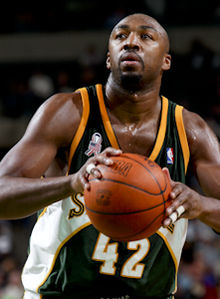
Vin Baker was an NBA All-Star player with the Sonics during the 1997-98 season.
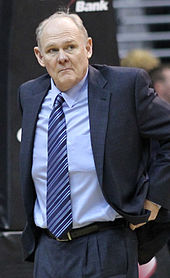
George Karl was head coach of the SuperSonics for six seasons (1992-1998).
.jpg)
The SuperSonics played most of their home games in their own KeyArena.

Jack Sikma in 1978
.jpg)
Point guard Lee Winfield during a game against the Atlanta Hawks (on a 1972 stadium newspaper).
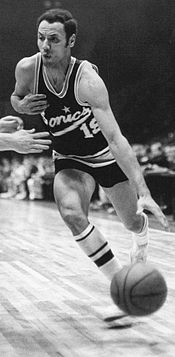
Lenny Wilkens in a SuperSonics jersey (1968).
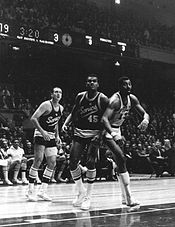
Tom Meschery and Bob Rule during the Sonics' expansion season (circa 1967/68).
Relocation to Oklahoma City
See also: Oklahoma City Thunder
From 2001 to 2006, Starbucks CEO Howard Schultz was the majority owner of the SuperSonics franchise, along with 58 partners and minor shareholders, in Basketball Club of Seattle LLP. On July 18, 2006, Schultz sold the SuperSonics and subsidiary team Seattle Storm (WNBA), to Professional Basketball Club LLC (PBC), a group of Oklahoma City entrepreneurs for $350 million. The franchise relocated to Oklahoma City in 2008 and has played there under the name Oklahoma City Thunder ever since.
Before the sale, the Basketball Club of Seattle LLP tried to convince Washington state officials to contribute enough money to modernize KeyArena. When both parties failed to reach an agreement, the PBC, chaired by entrepreneur Clay Bennett, bought the franchise. Schultz sold the team to Bennett's group, convinced they would not relocate to Oklahoma City and instead stay in Seattle. Oklahoma City Mayor Mick Cornett said, "I think it's presumptuous to assume that Clay Bennett and his group won't keep the Seattle team in Seattle or anywhere else for a long, long time. It's presumptuous to assume they're moving the franchise to Oklahoma City. [...] I understand that people think it's the most likely scenario, but that's just speculation."
After failing to reach an agreement with local politicians and the new owners to build a $500 million arena in the Seattle suburb of Renton, Bennett's group notified the National Basketball Association (NBA) that it was considering a move to Oklahoma City. In addition, the city of Seattle should terminate the KeyArena lease that was still in effect. When a judge denied this request, Seattle sued Bennett's group to fulfill the lease, which required the team to play at KeyArena until 2010.
The NBA approved a possible move by the SuperSonics to Oklahoma City on April 18 by a 28-2 vote. Only Mark Cuban of the Dallas Mavericks and Paul Allen of Seattle's rival Portland Trail Blazers voted against the move. The approval meant the relocation to Oklahoma City's Ford Center was approved for the 2008-09 season once an agreement was reached with the city of Seattle.
On July 2, 2008, an agreement was reached that allowed the move under certain stipulations. These included the payment of $45 million to Seattle and the possibility of another $30 million in 2013 if no new franchise had settled in the city by then. In addition, the name "SuperSonics" was not allowed to be used by Oklahoma City and the franchise's history will be used by Oklahoma City and any future NBA teams in Seattle. The team began play under the name "Oklahoma City Thunder" in the 2008-09 season after they became the third NBA franchise in the last decade to relocate.
In the months leading up to the deal, Seattle released email conversations from Bennett's Professional Basketball Club LLC that indicated several members of the group expressed a desire to move the franchise to Oklahoma City even before the sale. Previously, Sonics co-owner Aubrey McClendon told the Journal Record, an Oklahoma City newspaper, that "we didn't buy the team to leave it in Seattle; we hoped to come here," though Bennett denied knowledge of that. Seattle used those incidents to accuse the group of wrongful intent in the buyout negotiations. The city encouraged Schultz to file a lawsuit to set aside the sale and seek ownership of the team to a, court-appointed beneficiary. For the NBA, Schultz's lawsuit was moot because he signed a clause prohibiting him from suing Bennett's group. Schultz withdrew the suit before the start of the 2008-09 season.
In 2009, Seattle filmmakers called the Seattle SuperSonics Historical Preservation Society produced the documentary Sonicsgate, which chronicled the rise and fall of the SuperSonics franchise. The film focused on the more scandalous aspects of the team's departure from Seattle. It won the award for Best Sports Film at the 2010 Webby Awards.
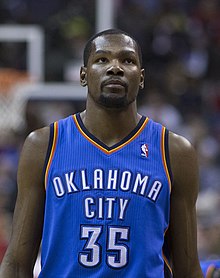
Kevin Durant was the franchise's most important player until his departure in 2016
Search within the encyclopedia